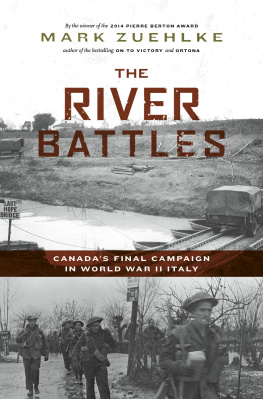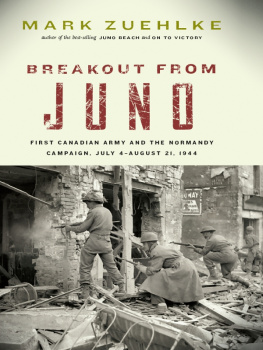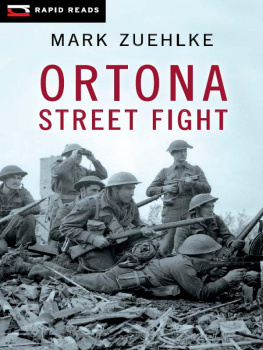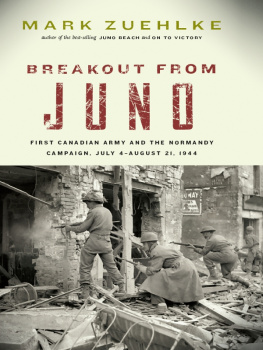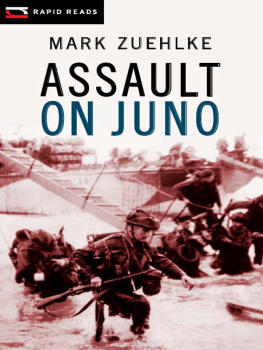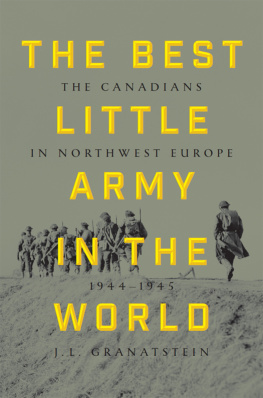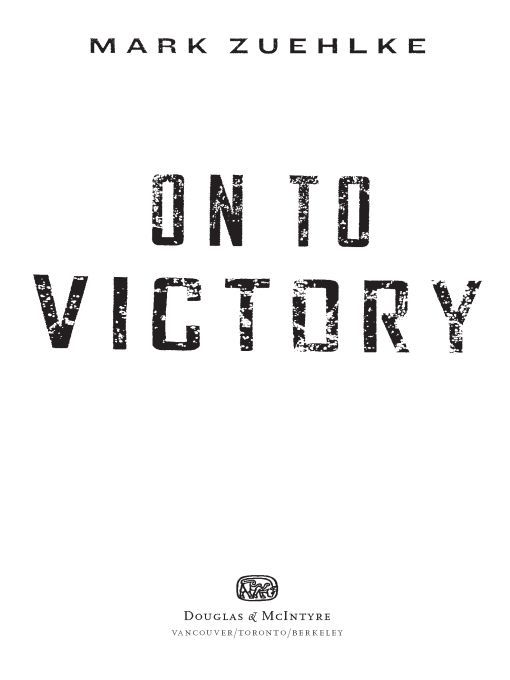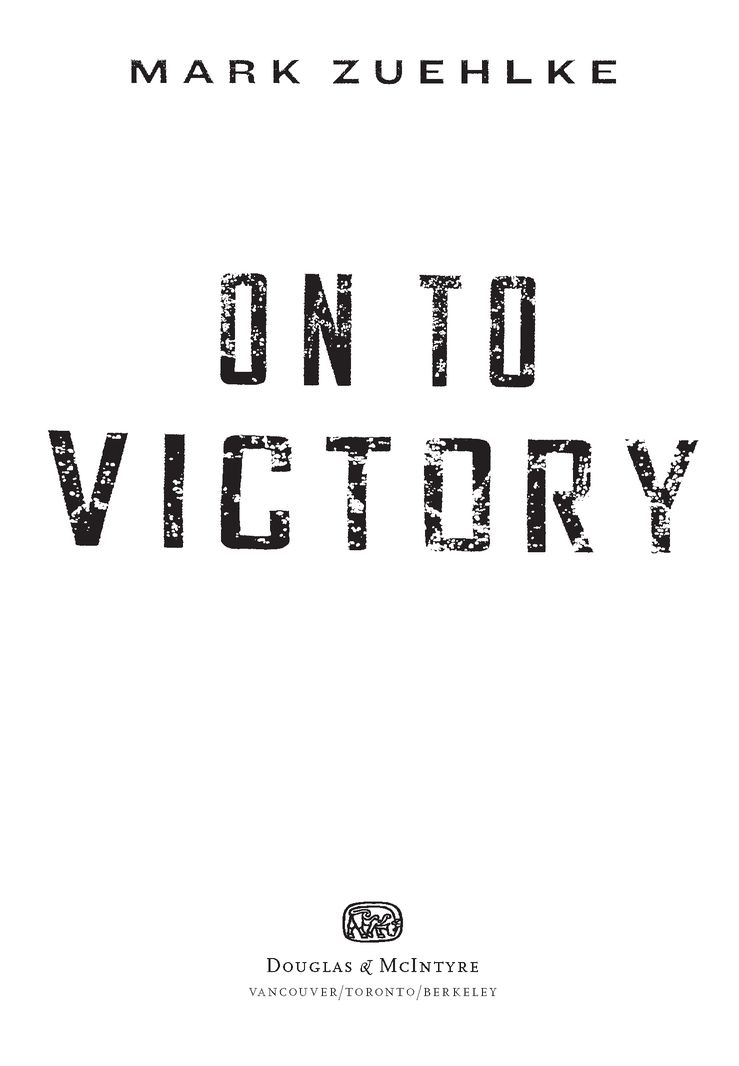Table of Contents
THE CANADIAN LIBERATION OF
THE NETHERLANDS,
MARCH23MAY5, 1945
through the Canada Book Fund for our publishing activities.
THE CANADIAN BATTLE SERIES
Operation Husky: The Canadian Invasion of Sicily, July 10-August 7, 1943
Terrible Victory: First Canadian Army and the Scheldt Estuary Campaign, September 13-November 6, 1943
Holding Juno: Canadas Heroic Defence of the D-Day Beaches, June 7-12, 1944
Juno Beach: Canadas D-Day Victory: June 6, 1944
The Gothic Line: Canadas Month of Hell in World War II Italy
The Liri Valley: Canadas World War II Breakthrough to Rome
Ortona: Canadas Epic World War II Battle
OTHER MILITARY HISTORY BOOKS BY MARK ZUEHLKE
The Canadian Military Atlas: Four Centuries of Conflict from New France to Kosovo (with C. Stuart Daniel)*
Brave Battalion: The Remarkable Saga of the 16th Battalion (Canadian Scottish) in the First World War
The Gallant Cause: Canadians in the Spanish Civil War, 1936-1939
For Honours Sake: The War of 1812 and the Brokering of an Uneasy Peace
*Available from D&M Publishers Inc.
My dear General, the German is whipped. Weve got him. He is all through.
Prime Minister Churchill to General Eisenhower, March 24, 1945
You kept getting this news from home... And theyd say, it was practically oversporadic fighting and... only pockets to be cleaned up. Some of them goddamn pockets were pretty tough.
Don Fowle, Signaller, Lincoln and Welland Regiment
A lot of Canadian soldiers have stories about liberating the Dutch. We were in Germany for all that time and never liberated anybody.
4th Canadian Armoured Division Veteran
Near the end of the war, nobody wanted to get killed.
Lance Corporal Stuart Johns, Canadian Grenadier Guards
PREFACE
WHEN I EXPLAINED the time frame that On to Victory encompassed, Dr. Steve Harris at the Directorate of Heritage and History, Department of National Defence, in Ottawa commented that this would be a very different book from the others in the Canadian Battle Series. No real major battles, he said, just lots of minor, small actions. It was an opinion repeated often by other historians and even agreed to by some of the veterans involved in those battles. In his book tracing First Canadian Armys march across Northwest Europe from Normandy to victory, Terry Copp correctly pointed out that the events of April and May 1945 have been paid slight attention by Canadian historians. Perhaps, he speculated, the great battles of the preceding February and March in the Rhineland had exhausted historians and their assigned word counts just as they had badly worn down the Canadian soldiers who fought there. Whatever the reason, the last weeks of the war have been relegated almost to the status of endnotes in many histories.
On to Victory is the first major account detailing the experiences of First Canadian Army from the moment it joined in Operation Plunderthe forced crossing of the Rhinethrough to wars end. Those last short weeks where each days fighting brought the finish closer, and every death seemed crueller because so little war remained, proved to contain a story of far greater complexity than I had anticipated. Yes, there were many minor actions. But there were also battles of fierce and prolonged intensity. Repeatedly the Germans defended towns both small and large with grim determination. Most canals and river crossings also met strong resistance from an enemy that seemed unwilling to admit that their cause was lost, the ultimate defeat of their nation inevitable and close.
Often when historical events have been scantily told, part of the reason is a shortage of contemporary accounts. Hardly the case here, for in those last days First Canadian Army seemed to be stacking up accounts of its actions as quickly as it spent shells. I was blessed to find hundreds upon hundreds of pages of material, including war diaries, after-action reports, detailed summaries compiled shortly after the armistice, and regimental histories written in the months spent awaiting repatriation. Added to this, of course, were the many veteran accounts. From all these sources it was possible to put together an account of most military operations in which First Canadian Army was involved in the Netherlands and western Germany with remarkable detail and accuracy.
As before, I was struck by how veteran recollections of events accorded closely to the official accountseach serving to inform the other in ways that assured clarity and fullness. Where a gap existed in the official records, veterans provided stories that added depth and continuity. When veterans were unsure of where or when a certain event occurred, the details could usually be ferreted out from the documented records.
Unfortunately, time is taking its toll on the men and women who fought in World War II. Each year the number passing on grows exponentially. There is little time left to gather the stories of those still able to tell them. If you know a veteran, either a friend or relative, please consider trying to record their experiences in one form or another. Then donate the material to an archive, museum, or other depository where it will be preserved for future researchers and generations.
The Canadian Battle Series is first and foremost a work of remembrance, intended to honour the experiences of a nations soldiers during the most catastrophic war of modern history. By presenting the many battles they fought in a deeply detailed you are there style, I hope to enable readers of all ages to comprehend the reality of what those who are now old endured when they were young soldiers, wanting desperately to live and again see a world at peace.
ACKNOWLEDGEMENTS
THE RESEARCHING OF each Canadian Battle Series book results in new acquaintances and the renewing of relationships developed during work on titles past. In the latter category, I wish to thank veteran Charles Goodman, who again shared his experiences as a young signaller in the South Saskatchewan Regiment. A veteran in the former group is Gordie Bannerman, who provided much information on the Battle of Otterloo and also connected me to a Vancouver Island group of veterans who meet monthly for lunch. Other veterans also provided interviews or correspondence and are mentioned in the bibliography.
Ken MacLeod spent a great deal of time sorting through his taped interviews and transcripts to provide a wealth of personal stories. Rosalie Hartigan kindly provided her late husbands written account of 1st Parachute Battalion in Operation Varsity and granted me permission to quote from it.
A number of people played important roles during my research trip to the Netherlands. In Groesbeek, the charming and knowledgeable Marco Cillessen took time away from work and family to spend several days showing me in detail the Rhineland, Operation Plunder, and Operation Varsity battlegrounds. For the latter part of my travels in Holland, I acted as historian for Marilyn Minness 2009 Legacy Battlefield Tour of the Scheldt Estuary and Liberation campaigns. Two tour participants deserve special mention. Bernard Diepman was a young boy during the liberation, and he shared many memories of his experiences, as well as commenting on various aspects of the battles and the influence on events of Dutch geography, topography, and climate. Another Dutch-Canadian, Bert Perey, also helped shape my understanding of the influences of Dutch countryside and culture on the liberation story. Both were also just a lot of fun to be around. Tour driver and retired Canadian armoured regiment officer Mike Charrier was always happy to provide extensive briefings on the pluses and minuses of Canadian and German armour. Fortunately, there are countless Canadian Shermans serving as monuments throughout Holland to provide opportunities for hands-on examination. Mike also always had his hotel room open for Bernard, Bert, and me to drop in and continue discussions started during the day.


